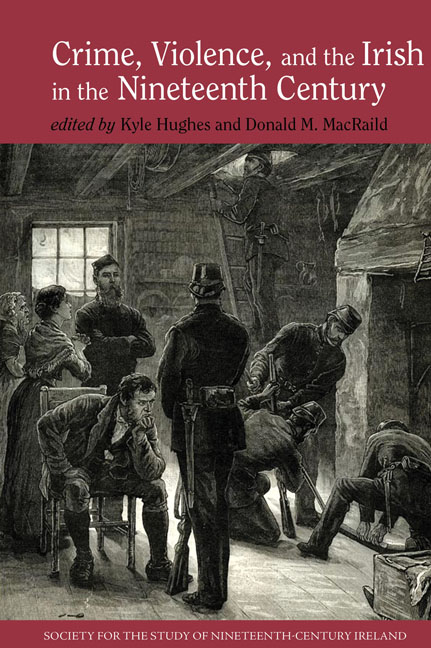Book contents
- Frontmatter
- Contents
- List of Illustrations
- List of Contributors
- Introduction: Crime, Violence, and the Irish in the Nineteenth Century; Themes and Perspectives
- Section 1 ‘Secret Societies’ and Collective Violence
- 1 Whiteboys and Ribbonmen: What's in a Name?
- 2 The Law of Captain Rock
- 3 ‘Night Marauders’ and ‘Deluded Wretches’: Public Discourses on Ribbonism in Pre-Famine Ireland
- 4 Organised Labour in Limerick City, 1819–1821: Violence and the Struggle for Legitimacy
- Section 2 The Law and its Responses
- Section 3 Sectarianism and Violence
- Section 4 Manifestations of Crime and Violence
- Index
4 - Organised Labour in Limerick City, 1819–1821: Violence and the Struggle for Legitimacy
from Section 1 - ‘Secret Societies’ and Collective Violence
- Frontmatter
- Contents
- List of Illustrations
- List of Contributors
- Introduction: Crime, Violence, and the Irish in the Nineteenth Century; Themes and Perspectives
- Section 1 ‘Secret Societies’ and Collective Violence
- 1 Whiteboys and Ribbonmen: What's in a Name?
- 2 The Law of Captain Rock
- 3 ‘Night Marauders’ and ‘Deluded Wretches’: Public Discourses on Ribbonism in Pre-Famine Ireland
- 4 Organised Labour in Limerick City, 1819–1821: Violence and the Struggle for Legitimacy
- Section 2 The Law and its Responses
- Section 3 Sectarianism and Violence
- Section 4 Manifestations of Crime and Violence
- Index
Summary
This chapter seeks to describe the actions, motives, and world view of the early progenitors of the nineteenth-century Limerick labour tradition. The first tentative attempts to explain the origins of organised labour in Limerick were a product of local journalism and the vague oral testimony of senior artisans in the late 1890s. Later, in the mid- to late twentieth century, the question of the city's nineteenth-century labour genesis was touched upon in some academic studies primarily focused upon the medieval guild system and the twentieth-century trade union tradition with the latter approach particularly judgemental and dismissive of the nineteenth-century labour movement.
General labour histories tend to describe the eighteenth-century labour bodies as guilds and their nineteenth-century heirs as trade unions, and many labour historians have chosen to depict the latter as usurpers of the old guild system. Labour history, as narrated by the Irish unions themselves, suggested some level of continuity between the guild system and its trade union successors and with the Limerick situation there is, apparently, no emergence of trade unionism as the labour bodies continued to describe themselves as ‘guilds’ until the 1890s. The authentic Limerick guilds, however, were last fully functional in the mid-eighteenth century and at that point they were entirely Protestant thanks to a range of national and municipal legislation whereas the aforementioned ‘guilds’ of the nineteenth century were overwhelmingly Catholic and bereft of whatever civic rights the guilds of the eighteenth century were ever entitled to.
The concept of a foundation date is problematic but the year 1824 would indeed appear to mark the beginning of a new tradition with the birth of the Congregated Trades of Limerick—a pan-trade governing body which was founded in response to O'Connell and the Catholic Association. The birth of the Congregated Trades in 1824, however, does not mark the true genesis of this new post-guild tradition but rather the moderate and constitutionally aligned reincarnation of an earlier militant body named the United Trades of Limerick, a body which emerged in a violent transitionary period during the years 1819–21. It is this transitionary body, and its violent methods of enforcing its demands, which is the principal subject of this study.
- Type
- Chapter
- Information
- Crime, Violence and the Irish in the Nineteenth Century , pp. 67 - 84Publisher: Liverpool University PressPrint publication year: 2017

